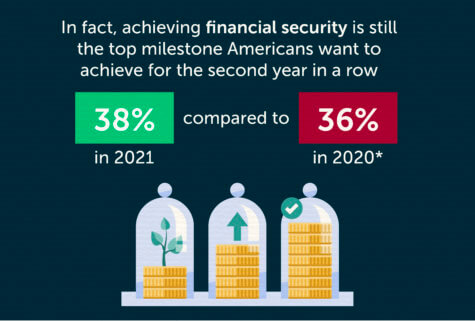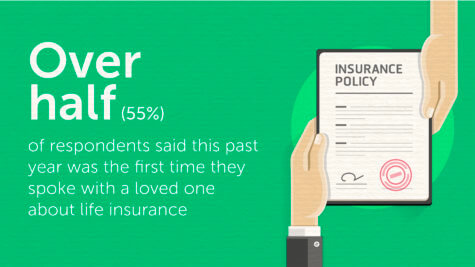NEW YORK — Sometimes, all it takes is a world-changing crisis to give people a new perspective on life. A majority of Americans say they’re planning to focus more on health and happiness rather than career and success after the COVID-19 pandemic. For many, that also means getting their financial flaws in order too.
The OnePoll survey asked 2,000 Americans about the impact COVID-19 has had on their lives and what lessons they’ve learned in the past year. Two in three people (68%) are planning to emerge from quarantine with an entirely new attitude. In fact, seven in 10 respondents said they’re planning to live each and every day to the fullest after COVID.
Commissioned by Life Happens — a nonprofit educating consumers about the importance of life insurance, for their annual Insure Your Love campaign — the survey reveals 71 percent of Americans value the little things in life more than ever because of the pandemic.
Focusing on the little things in life
Some of the small wins Americans are pursuing at this time include speaking to their families more (45%), speaking their minds more truthfully (43%), and taking more vacation time when it’s safe to do so (42%). Four in 10 respondents also shared they plan to be more confident and express themselves creatively as a part of this small win revolution.
 This isn’t to say respondents aren’t focusing on big life decisions during this time. In fact, three quarters of the poll said it’s important for them to get their finances in order in 2021. Achieving financial security is the most important milestone for Americans to achieve for the second year in a row (38% in 2021 compared to 36% in 2020).
This isn’t to say respondents aren’t focusing on big life decisions during this time. In fact, three quarters of the poll said it’s important for them to get their finances in order in 2021. Achieving financial security is the most important milestone for Americans to achieve for the second year in a row (38% in 2021 compared to 36% in 2020).
“Traditional milestones and outlooks on life have been upended, leading many to reevaluate what’s important in life and their relationships. For many, the past year has emphasized that there is no better financial security for your loved ones than life insurance, with our study showing that more than a quarter (29%) consider getting life insurance a ‘small act of love,’” says Faisa Stafford, President and CEO of Life Happens, in a statement.
Another important milestone for Americans includes becoming debt free – up eight percent compared to last year’s survey (26% in 2021 vs. 18% in 2020). The year-to-year results also show that two milestones in particular are less of a priority this year; the first being marriage (down 11%) followed by achieving a successful career (down 5%).
Researchers say this is most likely due to the COVID-19 pandemic. Nearly six in 10 people (58%) said the virus has drastically changed which milestones they’d like to accomplish in life.
Preparing for an uncertain future
The survey also asked respondents about the top discussions about life insurance they’ve had over the last year. The two biggest talking points revolve around the need for a significant other to buy a life insurance policy (40%) and reviewing existing life insurance policies (37%).
 “For our loved ones, including our children, we want to be as prepared as we can be and anticipate anything that may arise. This can mean filling up the nursery, stocking up for any emergencies and also thinking about our finances long-term. You create a lifelong toolbox that has all your essentials. Our biggest job is to ensure security for our children and loved ones, let’s make sure to add life insurance in that toolbox to make it complete,” Life Happens partner Dr. Reena Patel, a licensed psychologist and board-certified behavior analyst explains.
“For our loved ones, including our children, we want to be as prepared as we can be and anticipate anything that may arise. This can mean filling up the nursery, stocking up for any emergencies and also thinking about our finances long-term. You create a lifelong toolbox that has all your essentials. Our biggest job is to ensure security for our children and loved ones, let’s make sure to add life insurance in that toolbox to make it complete,” Life Happens partner Dr. Reena Patel, a licensed psychologist and board-certified behavior analyst explains.
One of those “small wins” may have to do with talking about finances. In fact, over half (55%) of respondents said this past year was the first time they spoke with a loved one about life insurance specifically. This was particularly true among millennials – with 65 percent agreeing with this statement.
When it comes to reasons for avoiding talking about finances during the pandemic, men (31%) and women (37%) both agreed that arguing with their significant other over money was the leading cause. Despite this, a third of respondents also sat down to chat about the need to buy a life insurance policy or change their current beneficiary.
It’s also become less taboo to talk about life insurance at the dinner table compared to last year’s data. Researchers find a nine-percent decrease in respondents unwilling to bring up life insurance at the table (27%) in 2021.
